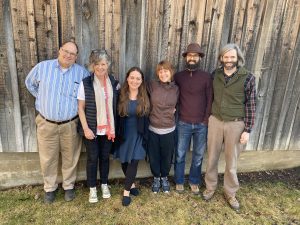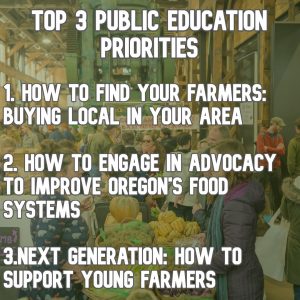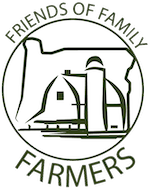2020 has been a bittersweet year for many of Oregon’s farmers. The pandemic closed many sales outlets, from restaurants to schools and business campuses, but it also sparked an interest in local food for many new customers looking to boost the resilience of the region. Widespread demonstrations about racial injustice in this country shined light on issues that have been kept in the shadows for too long. Although these are not new developments, there is more conversation in the agricultural community than ever before and when you know better, you can do better. Wildfire ravaged many parts of the state, consuming homes and farms throughout Oregon. This devastation brought communities together and sparked a tangible conversation about community disaster preparedness that will help our farms be more resilient in the future.
Through all this, Friends of Family Farmers has stayed nimble and pivoted our programming to where it matters most. Although we know that just like effluence flowing from a farm upstream or canola seed blowing over a fence line, these challenges will not be magically stopped at the border of 2020. But we have learned valuable lessons in how durable and irrepressible our mission remains. Farmers and advocates have a shared perspective: When things get tough, the tough work harder.
Here’s how we did this in the past year:
Organizational Updates
In 2020 FoFF welcomed two new staff members and three new board members to bring our organization up to capacity. Alice Morrison came to FoFF in January to work as the Willamette Valley Organizer (based in Eastern Lane County) and the Oregon Pasture Network Program Manager. She brought her background as a community organizer, farmers market manager and direct market farmer to reinvigorate FoFF’s network in the area and continue to move OPN forward. Amy Wong joined FoFF in June as our new Policy Director. We are so grateful to have this wealth of knowledge and experience brought to our staff. Amy has been working with other specialty seed producers on legal and regulatory issues in her role as an attorney for years and previously worked as Chief of Staff for Oregon State Senator Jeff Golden. This experience makes her the perfect advocate for FoFF farmers in the legislative and regulatory space.
FoFF also welcomed three new board members, bringing lots of energy, dedication and new perspectives to governing our organization. Sarah Ballini-Ross is a pastured livestock producer in Scio at Rossallini Farms and works for SAIF as a Safety Advancement and Innovation Project Coordinator. She balances farm life with work life and brings a deep knowledge of industry standards and process to the board. Aliesje King is the Program Director for the Sauvie Island Center in the Portland Metro Area. As a farm and garden educator, Aliesje brings a passion to get everyone, especially young people excited and involved in the agricultural process. Shaun Winter is an entrepreneur and pepper breeder living in Eugene, OR. After working on farms in Northern California and learning from some visionary producers, Shaun bred his own specialty pepper which became the basis for his hot sauce business, Hot Winter Hot Sauce. He brings practical knowledge of the value added farm product realm and expands the agricultural knowledge on the board. These folks joined returning board members Susan Richman, Greg Malinowski, and Hank Keogh to guide FoFF in 2020.

FoFF chose to leave our physical office behind at the end of 2019, and boy are we thankful for that choice now! As a fully remote organization, our work flow was not interrupted (in that way at least!) by the pandemic. This meant we were ready to serve our communities without leaving our homes.
Advocacy Updates
2020 has also not been a “normal” year for legislation and regulatory bodies. Because most physical offices in Salem remain closed, our advocacy has shifted from walking the halls at the capital and speaking in committee meetings to submitting testimony, attending numerous virtual hearings, and participating in more working groups. Here are some of the actions we took:
- Meat Processing Infrastructure: FoFF’s advocates worked with ODA and legislators to push for meat processing reform, helping to pass a bill in the short legislative session to authorize a state inspection program, and participating in ongoing working groups to make sure new programs work for small farms.
- Government Pandemic Response: We were invited as part of only 4 groups to testify at the Oregon House Committee on Agriculture and Land Use to bring awareness to how the pandemic was affecting market access and gave feedback to ODA on the rollout of federal CFAP assistance for small farms.
- Stockwatering Exemption: With the help of our partners in the Stand Up to Factory Farms Coalition, we filed a formal petition to close the stockwatering loophole used by gigantic factory farms in groundwater protection areas. While we are still waiting for decisive action by the Oregon Water Resources Commission, we are continuing to drill down on the real costs of factory farms for Oregon’s farmers and communities.

Program Updates
Throughout this unprecedented time, we have continued our program work to provide services to farmers and connect them with the eaters who love their food.
- Farmland Access: FoFF continues to work for better farmland access by completing a technical assistance pilot program for Oregon Farm Link in which our staff worked with land seekers and land holders to find land tenure solutions. We plan to build on and expand this program in 2021.
- Pastured Producer Promotion: Our Oregon Pasture Network (OPN), expanded to 75 members across the state. Through our beautiful new website and pastured product guide, more people were able to find their local producers.
- Farmer Education: Due to the pandemic, our annual OPN pasture management courses went online. This enabled us to increase enrollment in the courses and bring this important info to people right on their farms. Over 100 farmers from around the state participated in our 2 multi-day OPN courses.
- InFARMation Series: We went virtual with our popular InFARMation series and tackled topics relating to the pandemic and food supply in the spring and a series on the experiences of BIPOC farmers in Oregon in partnership with Small Farms School in the Fall.
- Portland COVID-safe Fill Your Pantry: We partnered with Slow Food Portland to adapt the Portland local food bulk buying event from a one day, indoor, pick up and walk up sales event (as it has been in years past), to a week-long partnership with Portland area Farmers Markets to keep all patrons and farmers outside and socially distanced.
Community Efforts
This year has taken us in some new directions as well. In the absence of in-person gatherings, we took some actions to keep farmers connected and able to help each other.
- 2020 Family Farmer Survey: Although we were not able to conduct our biennial Outreach Tour this spring (aka Listening Sessions), we were able to connect with farmers, eaters and food advocates through our Family Farms Survey. We gathered a record 695 responses to help us narrow our priorities for the coming Legislative Session.
- Farmer Disaster Relief: FoFF served on the committee and administered Farm Aid’s Pacific NW COVID-19 Farmer Resilience Initiative to help farmers with personal expenses during the pandemic. A few months later, we helped raise money for and coordinate the Oregon Small Farms Wildfire Relief Fund.
- Farmer Chats: In early April, we began hosting a virtual place for farmers to come together to give advice and share experiences about the unique challenges faced by small farming operations. They began as technical discussions about COVID safety and available resources. In July we shifted the Chats to a place for farmers and ranchers to talk about racial justice in their communities. We held 14 of these gatherings and intend to continue in some form in 2021.

We could not have accomplished any of this without the support and confidence of thousands of supporters like you. You can help us sustain our impact into the next year by making a tax deductible donation to FoFF. Join us and help us create our vision of an Oregon full of thriving family farms.

